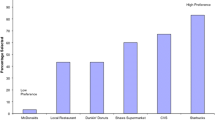Abstract
When presenting reinforcers to individuals with developmental disabilities, many researchers use food. However, there may be other types of reinforcers which may be equally or more effective. Although preference assessment methods have been well-researched, one area that has not yet been resolved is whether food reinforcers are always more preferred than non-food reinforcers, when both are presented in the same assessment. This study compared preference for food and non-food items with similar and dissimilar reinforcing values in three people with developmental disabilities. The study first evaluated the reinforcing value of food and non-food items in an ABAB design. Selected food and non-food items with similar and dissimilar reinforcing values were presented in a subsequent paired-stimulus preference assessment. Results showed that when food and non-food items were of approximately equal reinforcing value, or when food was more reinforcing than the non-food items, food tended to be preferred. However, when non-food items were much more reinforcing than food items, non-food items tended to be preferred.




Similar content being viewed by others
References
Andakyan, L., Fryling, M. J., & Benjamin, K. (2016). Further evaluation of the displacement of leisure items by food during stimulus preference assessments with children with autism. Journal of Developmental and Physical Disabilities, 28(3), 461–467. https://doi.org/10.1007/s10882-016-9483-3.
Bojak, S. L., & Carr, J. E. (1999). On the displacement of leisure items by food during multiple-stimulus preference assessments. Journal of Applied Behavior Analysis, 32(4), 515–518. https://doi.org/10.1901/jaba.1999.32-515.
DeLeon, I. G., Iwata, B. A., & Roscoe, E. M. (1997). Displacement of leisure Reinforcers by food during preference assessments. Journal of Applied Behavior Analysis, 30(3), 475–484. https://doi.org/10.1901/jaba.1997.30-475.
DeLeon, I. G., Frank, M. A., Gregory, M. K., & Allman, M. J. (2009). On the correspondence between preference assessment outcomes and progressive-ratio schedule assessments of stimulus value. Journal of Applied Behavior Analysis, 42, 729–733. https://doi.org/10.1901/jaba.2009.42-729.
Fahmie, T. A., Iwata, B. A., & Jann, K. E. (2015). Comparison of edible and leisure reinforcers. Journal of Applied Behavior Analysis, 48(2), 331–343. https://doi.org/10.1002/jaba.200.
Fisher, W., Piazza, C. C., Bowman, L. G., Hagopian, L. P., Owens, J. C., & Slevin, I. (1992). A comparison of two approaches for identifying reinforcers for persons with severe and profound disabilities. Journal of Applied Behavior Analysis, 25(2), 491–498. https://doi.org/10.1901/jaba.1992.25-491.
Fisher, W. W., Piazza, C. C., Bowman, L. G., & Amari, A. (1996). Integrating caregiver report with systematic choice assessment to enhance reinforcer identification. American Journal of Mental Retardation, 101(1), 15–25.
Hagopian, L. P., Long, E. S., & Rush, K. S. (2004). Preference assessment procedures for individuals with developmental disabilities. Behavior Modification, 28(5), 668–677. https://doi.org/10.1177/0145445503259836.
Lee, M., Yu, C. T., Martin, T. L., & Martin, G. L. (2010). On the relation between reinforcer efficacy and preference. Journal of Applied Behavior Analysis, 43(1), 95–100. https://doi.org/10.1901/jaba.2010.43-95.
Tullis, C. A., Cannella-Malone, H. I., Basbigill, A. R., Yeager, A., Fleming, C. V., Payne, D., & Wu, P. F. (2011). Review of the choice and preference assessment literature for individuals with severe to profound disabilities. Education and Training in Autism and Developmental Disabilities, 46(4), 576–595.
Acknowledgments
This research was supported by the Joseph-Armand Bombardier Canada Graduate Scholarship, offered through the Social Sciences and Humanities Research Council of Canada, awarded to the first author. We thank the participants of this study and the staff of St.Amant and St.Amant Research Centre for their administrative support throughout the study.
Author information
Authors and Affiliations
Corresponding author
Ethics declarations
Ethical Approval
All procedures performed in studies involving human participants were in accordance with the ethical standards of the institutional and/or national research committee and with the 1964 Helsinki declaration and its later amendments or comparable ethical standards.
Informed Consent
Informed consent was obtained from the guardian of all individual participants in the study.
Conflict of Interest
All authors declare that they have no conflict of interest.
Additional information
Publisher’s Note
Springer Nature remains neutral with regard to jurisdictional claims in published maps and institutional affiliations.
Rights and permissions
About this article
Cite this article
Heckert, R.N., Yu, C.T. & Barca, M. Preference for Food and Non-food Items of Known Reinforcing Values in People with Developmental Disabilities. J Dev Phys Disabil 31, 541–553 (2019). https://doi.org/10.1007/s10882-019-09657-5
Published:
Issue Date:
DOI: https://doi.org/10.1007/s10882-019-09657-5




